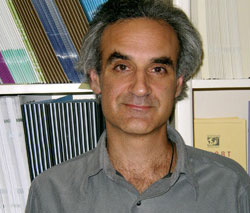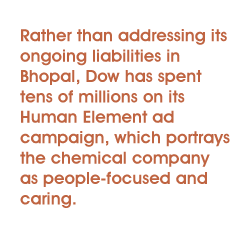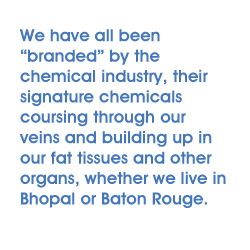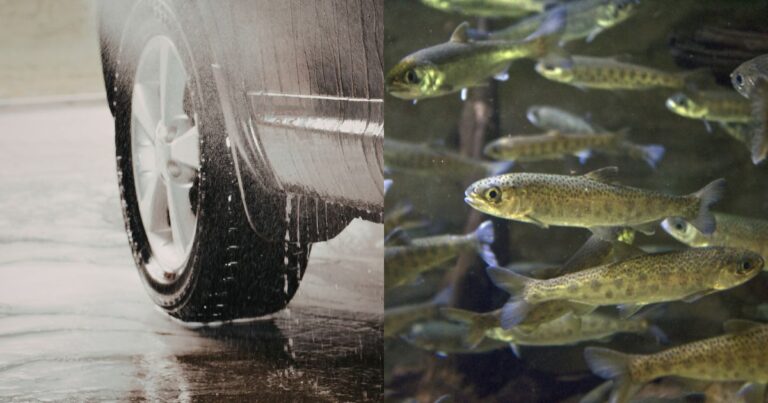 Below is an important essay from Gary Cohen, founder of Health Care Without Harm and a key member of our coalition. The 25th anniversary of the Union Carbide disaster in Bhopal, India is a mournful occasion, and an excellent reminder of how far we still have to go before we can truly say we have learned our lesson. This disaster brought tragedy to more than 8,000 people and their loved ones, and it also sparked the ‘right to know’ movement, which is a precursor to today’s movement to overhaul U.S. chemical regulations. How will we know when U.S. policy makers have finally learned the lessons that the Bhopal disaster offers? When Congress updates the Toxic Substances Control Act of 1976 to require manufacturers to disclose not only what chemicals are used to make their products, but also information on how these chemicals affect human health.
Below is an important essay from Gary Cohen, founder of Health Care Without Harm and a key member of our coalition. The 25th anniversary of the Union Carbide disaster in Bhopal, India is a mournful occasion, and an excellent reminder of how far we still have to go before we can truly say we have learned our lesson. This disaster brought tragedy to more than 8,000 people and their loved ones, and it also sparked the ‘right to know’ movement, which is a precursor to today’s movement to overhaul U.S. chemical regulations. How will we know when U.S. policy makers have finally learned the lessons that the Bhopal disaster offers? When Congress updates the Toxic Substances Control Act of 1976 to require manufacturers to disclose not only what chemicals are used to make their products, but also information on how these chemicals affect human health.
Dow Shall Not Trespass
Gary Cohen
President and Co-founder
Health Care Without Harm
November 30, 2009
Twenty-five years ago, a Union Carbide pesticide factory exploded in Bhopal, India, releasing a toxic cloud that killed thousands in its wake. More than 8,000 people died within the first three days of the disaster, while more than 500,000 were exposed to toxic gases that invaded their lungs and spread throughout their bodies. For this reason, Bhopal has been called the Hiroshima of the Chemical Industry.
 Twenty-five years later the abandoned factory has still not been cleaned up, but continues to leak poisons into neighborhood groundwater. A recent report by the Bhopal Medical Appeal found dangerous levels of heavy metals and persistent chemicals in the groundwater. Union Carbide executives have never been brought to trial in India, despite attempts by the Indian government to extradite them. And although Union Carbide was bought by Dow Chemical in 2001, the parent company claims no responsibility for cleaning up the mess left behind and has not submitted itself to the Indian criminal case. Rather than addressing its ongoing liabilities in Bhopal, Dow has spent tens of millions on its Human Element ad campaign, which portrays the chemical company as people-focused and caring.
Twenty-five years later the abandoned factory has still not been cleaned up, but continues to leak poisons into neighborhood groundwater. A recent report by the Bhopal Medical Appeal found dangerous levels of heavy metals and persistent chemicals in the groundwater. Union Carbide executives have never been brought to trial in India, despite attempts by the Indian government to extradite them. And although Union Carbide was bought by Dow Chemical in 2001, the parent company claims no responsibility for cleaning up the mess left behind and has not submitted itself to the Indian criminal case. Rather than addressing its ongoing liabilities in Bhopal, Dow has spent tens of millions on its Human Element ad campaign, which portrays the chemical company as people-focused and caring.
The world has learned a lot about the chemical industry since the Bhopal disaster. We now know that many of the industry’s products are linked to a broad array of diseases in the general population, including asthma, cancer, birth defects, infertility, Parkinson’s disease, endometriosis, obesity and diabetes. Rather than internalizing the consequences of pollution, the industry has externalized health and social costs onto individuals and the American healthcare system, which is being crushed under the weight of ballooning costs, chronic disease and misaligned priorities.
We have also learned that we all carry the by-products of the chemical industry in our bodies. These toxins pass into us from the food we eat, through plastics in everyday consumer products, through building materials in our houses and offices, and through our water and air. The Centers for Disease Control has documented that the average American carries more than 100 toxic chemicals in his or her body. Plastic additives bisphenol A and phthalates, the pesticide 2,4 D, and shampoo additive 1,4 dioxane are among those Dow Chemical products found widely in many people’s bodies. Even children are being born pre-polluted, already filled up with a plethora of toxic chemicals that can act like ticking time bombs, triggering health impacts later in life. Without our knowledge and our consent, we and our children have become guinea pigs in an uncontrolled chemical experiment in which Dow and the other chemical companies are running.
 Over the last twenty-five years, the Bhopal survivors’ plight and our own have become much more intertwined. We have all become united in a global web of chemical poisons. We have all been “branded” by the chemical industry, their signature chemicals coursing through our veins and building up in our fat tissue and other organs, whether we live in Bhopal or Baton Rouge.
Over the last twenty-five years, the Bhopal survivors’ plight and our own have become much more intertwined. We have all become united in a global web of chemical poisons. We have all been “branded” by the chemical industry, their signature chemicals coursing through our veins and building up in our fat tissue and other organs, whether we live in Bhopal or Baton Rouge.
Given the new political momentum in the country to address environmental issues, healthcare delivery and even corporate negligence, its time to stand up to the chemical contamination of the American people and reassert our basic human rights and religious values. As a society, we should guarantee every American child the right to be born free of industrial chemicals. And as a society committed to freedom, we should defend the freedom of women to breastfeed their infants without passing their life supply of toxic chemicals onto them. We all have a right to a toxics-free future. The laws in our country and at a global level should guarantee these rights and the environmental conditions for our health and wellbeing.



